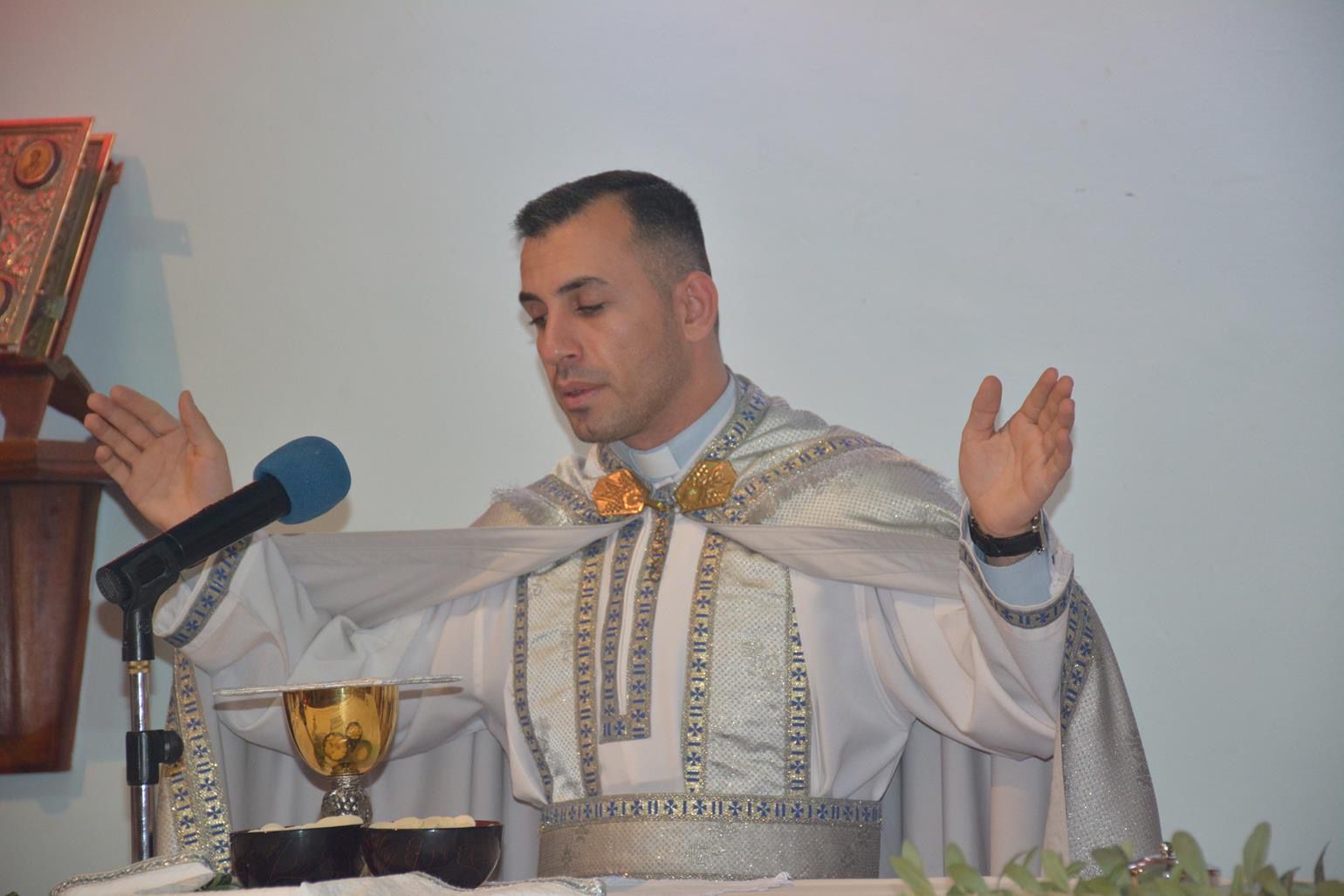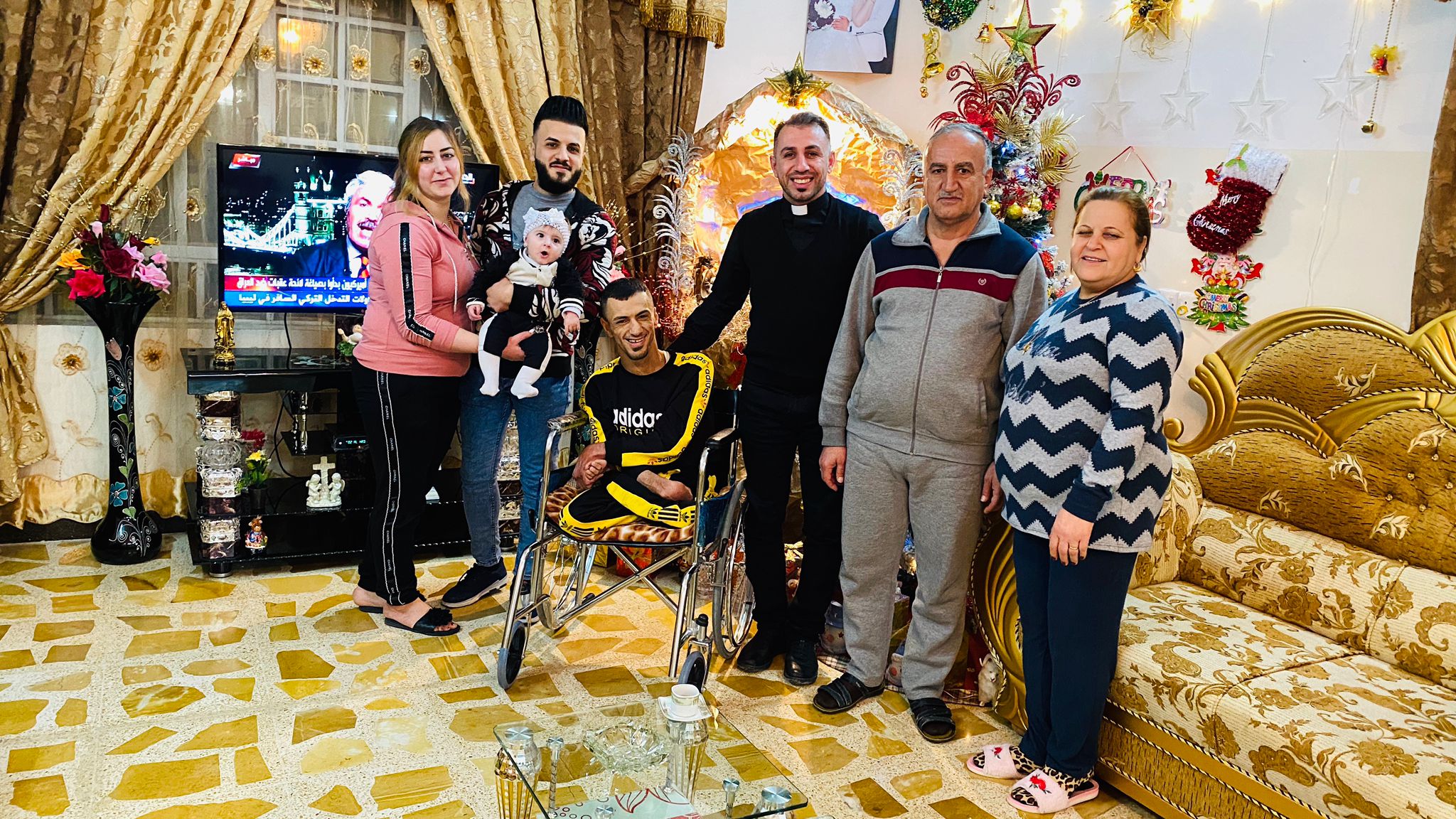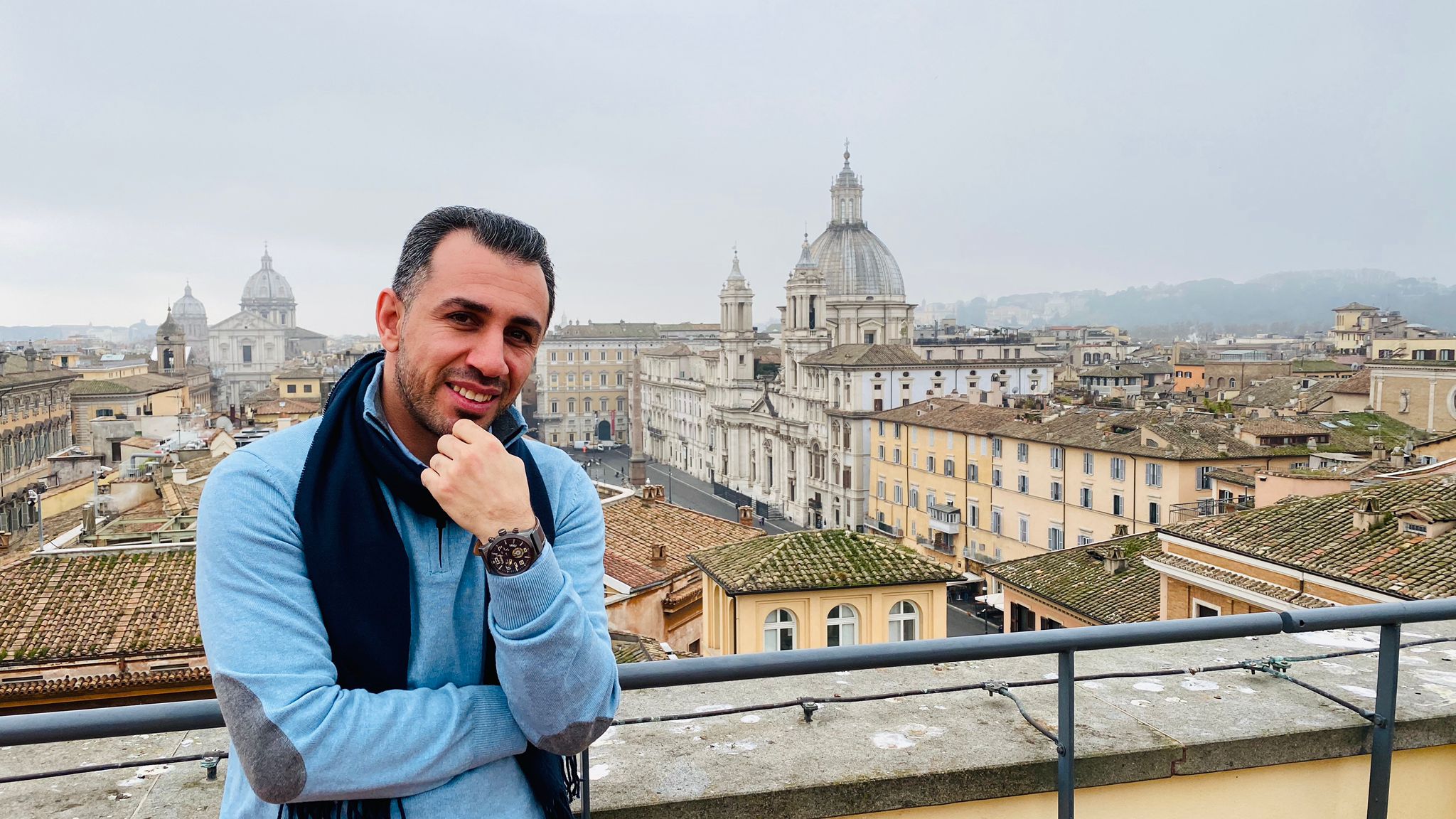
"The visit of the Holy Father represents a great challenge to those who want to destroy the country and will show the true values of Christianity, in a nation that already rejects Christians, in the perspective of the Encyclical Letter "Brothers all". For this is what my country needs: fraternity. So all Christians in Iraq hope that this trip will change something. In my opinion, at the social level, at the level of the people, many things will change, but at the political level, in Iraq I don't think much will change", he says.
"Thank you for inviting me to speak to our Spanish-speaking friends!Shlama o shina o taibotha dmaria saria ild kolwhich in Aramaic means "peace, tranquility and God's grace be with you all," greets Aram.
Unbelievable! It is shocking to hear Aramaic, the language of Jesus... And above all to know that it is the common language of many people, after two thousand years.
Yes, in fact Aramaic, in the Eastern Syriac dialect, is my mother tongue and the language of all the inhabitants of the area where I was born, in northern Iraq, which is called Tel Skuf, which means Bishop's Hill. It is located about 30 km from Mosul, the ancient city of Nineveh, in the Christian heart of the country.
So the whole village where you grew up is Christian.
Yes, a Catholic Christian of the Chaldean rite. Life there was very simple: almost all the inhabitants are peasants and live by cultivating their fields and taking care of their livestock. People exchanged the products of the land and each one had what they needed to live. In addition, it is present the custom of offering the first fruits of the harvest, each year, to the Church, to support the priests and so that they too can take care of those most in need.
I remember that the houses were big enough for a family to live in... And for us, family is something quite extensive: children, fathers, mothers, grandparents... They all live together in these typical oriental homes, white and square, with a courtyard in the center, like a garden, and the rooms around it.
But this idyllic peace lasted only a few years...
Well, in fact it never existed, because when I was born we were in the last year of the Iran-Iraq war, a war that lasted eight years and resulted in more than 1.5 million dead. My father and three of my uncles fought in the conflict and it was a very difficult time for my grandmother and mother. They hoped and prayed for their loved ones to come home. And they did, thank God, my father and his brothers came back.
And in 1991 another war broke out....
We stayed in our village only until 1992, when the First Gulf War ended, between Iraq on one side and Kuwait and the international coalition on the other. We moved to a large city in southern Iraq, Basra, the third largest city in the country after the capital Baghdad and Mosul. Most of its inhabitants are Shiite Muslims and there are not many Christians there. I still remember the salty water, the heat, the palm trees... A very different landscape from what I was used to. Also, the number of oil wells and refineries everywhere... But the people were and still are very generous and welcoming.
"The visit of the Holy Father represents a great challenge to those who want to destroy the country and will show the true values of Christianity."
In the picture, Aram Pano stands in the courtyard of the Sacred Heart of Jesus Church in Tel Kaif, a Christian city near Mosul, northern Iraq. He has not faced persecution face to face, but he has heard many stories of suffering.
"In 2004, two nuns were working with the U.S. Army in Basra. One day, when they returned home, a radical Islamic group killed the sisters in front of their house. This event spread throughout Iraq and my country became the epicenter of terrorism. In 2014 ISIS came and destroyed many of our churches and our homes. There is a plan to destroy the history of Christians in my country as they did in 1948 with the Jews," he says.
The city of Basra has two parishes that are part of the archieparchy of Basra and the South, with 800 faithful. In 1995 he received his First Holy Communion and it was then that he first felt the call to serve the Lord.
And how did it go?
The parish was like my home. I loved to go with the group of children to play with them but also for catechesis. But the idea of entering the seminary became clearer to me when I was in high school.
In the third war of your life you were sixteen years old. What are your memories of the Second Gulf Conflict?
led by the United States. It lasted almost 4 months and the last city to fall was Basra, where I lived. I remember seeing American planes coming in and bombing, and we were afraid, because many of the state buildings were close to our house. I remember one night I was sleeping and I woke up to the sound of a missile hitting a building about 500 meters away from us. We went out into the street, people were running and the Americans were throwing their sound bombs to strike terror into us. It was then that I could distinguish more clearly the call of the Lord.
It is moving to think that, although the voice of the Lord is not in the noise of missiles and sound bombs, it is heard, in all its sweetness, in the midst of this horror.
Yes, indeed. And also, if we hadn't suffered the terror of the bombings, my father wouldn't have asked the bishop for shelter: the church was very close to where we lived, but there, in the house of the Lord, we felt more secure. So, my father began to serve in the kitchen to reciprocate a little for the generosity with which we were welcomed. I, meanwhile, learned to serve at the altar with the priest. At the end of the war, our bishop chose me to go with him to a town called Misan.I was able to see the city of Basra, about 170 km northeast of Basra, and what I experienced there encouraged me to make my decision.
Do you want to tell us what happened to you?
When the bishop asked me to accompany him to Misan on his pastoral mission, my family first said no, they didn't want to. But I was very determined to go and I succeeded. When we arrived, I was surprised to see the faithful entering the church on their knees and without shoes. They knelt before the altar, in front of the icon of the Virgin Mary, weeping, praying, pleading.
Later, when the mass began, officiated by the bishop according to our Chaldean rite, I noticed that the faithful did not know the prayers or when to sit or stand up. This impressed me very much and I thought that they were like sheep without a shepherd. And immediately I looked at the bishop who was older and the thought crossed my mind as to who could replace him and help so many families.
It is impressive to see how Jesus is moved in front of the multitude who are like sheep without a shepherd.
Precisely! So, with this thought, I continued my studies at the Vocational Institute school and, in 2005, I entered the seminary in Baghdad, the capital of Iraq. There I studied philosophy and theology for 6 years and graduated in June 2011 and on September 9, 2011 I was ordained a priest.
"In Iraq there is a plan to destroy the history of Christians in our country."
After almost 10 years as a priest, Aram Pano, sent by his bishop, is studying Institutional Communication in Rome at the Pontifical University of the Holy Cross "because the world needs each one of us to contribute to evangelization. And especially in these times, in order to proclaim the Gospel, it is necessary to know the digital and communication culture. I have great hope for the future: we can all work together to spread our faith through all possible channels, while preserving our identity and our originality," he said.
Aram reminds Christians in the West not to forget their brothers who suffer persecution in countries like his own, Iraq, where he has lived through one conflict after another. After the last war, social life in Iraq has changed a lot.
"There has been a commodification of man. In the land where civilization was born, where man built the first cities, where the first legal code in history was born, everything seems to have ended in destruction: the strongest kills the weakest, corruption hovers over society and Christians have been suffering persecution for 1,400 years."
"Before 2003 Christians numbered 1.5 million and today we are 250,000. Persecution is not only something that has to do with physical survival: it extends to the social and political level, to job opportunities and even to the right to education," he says.

What are the problems in Iraq today and what does the Pope's visit mean?
The lack of honesty and willingness to rebuild the country means that Muslims have separated, the government thinks more about being loyal to neighboring countries than about the welfare of its citizens... And all this in the eyes of the United States. There is not one problem but many complicated problems.
I believe that politics, the service to the citizen, no longer exists, because it is in the hands of others from outside Iraq. However, the fruit of God's work is not within our reach and we pray that through this journey peace, Christ's love and unity will be announced to a people who can no longer bear it.
A people, moreover, where Christianity has left deep roots, especially the Chaldean Church.
Of course! In fact, Christianity came to Iraq with the apostles St. Thomas and Bartholomew and their disciples Thaddai (Addai) of Edessa and Mari in the second century: they founded the first Church in Mesopotamia and, thanks to their missionary work, they reached as far as India and China. Our liturgy comes from the oldest Christian Eucharistic anaphora, known as the Anaphora of Addai and Mari. The Church at that time was within the Persian Empire, with its own Eastern liturgy, its own architecture and a way of praying very similar to the Jewish liturgy.
The theology of our Eastern Church is spiritual and symbolic. There are many very important fathers and martyrs, such as Mar (Holy) Ephrem, Mar Narsei, Mar Theodore, Mar Abrahim of Kashkar, Mar Elijah al-Hiri, etc.
The Chaldean Catholic Church, which is in communion with Rome, was born as a result of a schism within the Church of Babylon, because of a rivalry between patriarchs, in particular, because one current wished to unite with Rome.
Our tradition, however, is typically oriental and has deep roots in the country, where traces of the millenary Christian presence can be found everywhere, with sanctuaries, monasteries, churches and very ancient traditions.
I hope that my stay in Rome will allow me to work on preserving this identity and this rich and long history, also using the tools and means that modernity allows us to have today.

This interview is part of the reports to celebrate the 25th anniversary of the School of Communication of the Pontifical University of the Holy Cross.
Throughout all these years, hundreds of students from all over the world, different languages, identities, histories, problems... have crossed paths at the Faculty.
It is a Faculty of Communication, where we learn that in this Babel that is our world, barriers and walls can be overthrown, as Pope Francis tells us, and we can truly be all brothers and sisters.
CARF - Centro Academico Romano Foundation has made a very important commitment to this task, awarding scholarships to students - priests, laity, religious, seminarians - from all continents, without distinction, and allowing them to use all the most modern tools through the financing of the theoretical and practical activities carried out at the Pontifical University of the Holy Cross, so that they can then return to their countries and plant there the seeds they have received in Rome, fostering the growth of fruits of peace, high-level formation, unity and ability to understand each other better, not only among Christians, but with people of every religion and identity.
Gerardo Ferrara
BA in History and Political Science, specializing in the Middle East.
Responsible for the student body of the University of the Holy Cross in Rome.